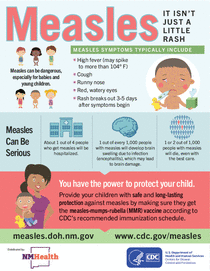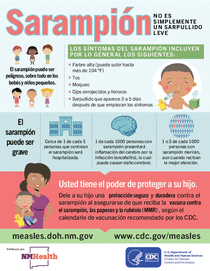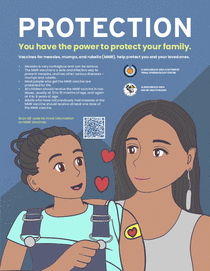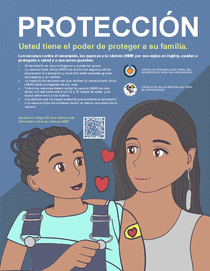2025 Measles Outbreak Guidance
The following page was created for the 2025 Measles Outbreak that ended September 2025. Dashboards are no longer being updated.
However, due to ongoing activity in other states and countries, we anticipate that there will continue to be isolated cases of measles. Below are valuable guidance and resources about measles as well as how to obtain the measles, mumps, rubella (MMR) vaccine to prevent this very contagious virus.
For questions about vaccinations, measles, or other health questions, please call the NMDOH Helpline at 1-833-SWNURSE (1-833-796-8773.)
Key points
- From February to September 2025, New Mexico had a measles outbreak totaling 100 cases in nine counties with one death. It was New Mexico’s first measles outbreak since 1996, and its largest in decades.
- Measles is very contagious and can be serious.
- Two doses of MMR vaccine provide the best protection against measles. For anyone still wanting to be vaccinated, the MMR vaccine is still widely available in New Mexico.
- Call the Department of Health Helpline at 1-833-796-8773:
- Ask questions about measles, vaccines or other medical questions.
- Guidance on measles exposures.
- Vaccination records.
- Reporting cases.
- To access your vaccination record, click on the button below. If you have problems, call 1-833-882-6454.
Your Vaccination Records
Overview
Measles is a highly contagious virus that spreads through the air when an infected person coughs or sneezes. It can cause fever, cough, runny nose, red eyes, and a rash that spreads over the body. Serious complications can occur, including pneumonia, brain swelling, and even death.
The best way to prevent getting sick is to be immunized against measles. Two doses of the MMR (measles, mumps, rubella) vaccine are highly effective at preventing measles.
Reports
Below are two dashboards outlining measles cases during the 2025 outbreak as well as the number of measles, mumps and rubella (MMR) vaccinations statewide from February through September 2025, compared to the same time period in 2024. Tens of thousands of New Mexico residents got their MMR vaccinations over the course of the 2025 outbreak, at times nearly doubling the number of doses given during the same time period in 2024. This effort will provide community protection against measles in the years to come. Measles cases continue to be reported nationwide to the Centers for Disease Control and Prevention (CDC).
2025 Measles Cases
Measles Vaccines Administered and Coverage Rates
Frequently asked questions:
Visit the page linked below for a list of frequently asked questions:
Guidance for professionals:
For Medical Professionals:
- NM Health Alert Network (HAN) advisories
- Measles Infection Prevention and Control Guidance
- Clinical Overview of Measles | CDC
- Measles Vaccine Recommendations | CDC
- MMR Travel and Outbreak Recommendations Provider Letter
- Scientific Laboratory Specimen Collection for Measles
- Evaluating a suspect measles patient presenting with rash
- Measles Contact Tracing for Healthcare Organizations
- Measles Post-Exposure Prophylaxis (PEP) Table
For Educators and Childcare Providers
For Non-Healthcare Employers
Infographics
Signage
Recent Activity
News Articles
Latest
- Possible measles exposure linked to travel in Albuquerque (January 6, 2026)
- New Mexico Health Department calls end of measles outbreak (September 26, 2025)
- New Mexicans respond to vaccination call (August 26, 2025)
Popular
- Lea County resident tests positive for measles after death (March 6, 2025)
- First New Mexico measles case of 2025 confirmed in Lea County (February 11, 2025)
- Measles outbreak declared in Lea County (February 14, 2025)
Publications
Latest
- Measles - What To Do if You're Exposed (Marketing)
- Sarampión Qué Hacer Si Ha Estado Expuesto (Spanish Version)
- Measles Post-Exposure Prophylaxis (PEP) Table (Guide)
- Measles Guidance for Schools | English Version (Guide)
Popular
- Measles Infographic – English (Marketing)
- Measles Infection Prevention and Control Guidance (Guide)
- Guía de prevención y control de la infección por sarampión (Spanish Version)
- Measles Guidance for Employers (Guide)
- Guía sobre el sarampión para empleadores (Spanish Version)
Resources
Latest
- Casos y brotes de sarampión | CDC
- How Do I Know If I Need A Measles Vaccine?
- ¿Cómo sé si necesito una vacuna contra el sarampión?












